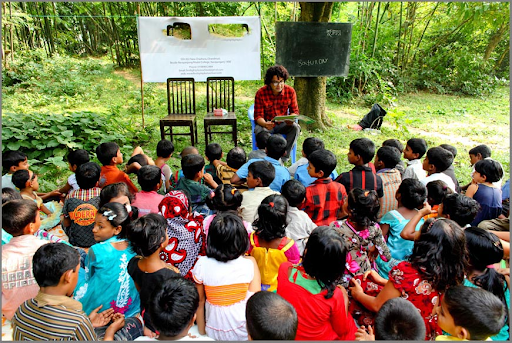visual curriculum
Education can mean different things to different people around the world. Some people see the education system as classroom training, while others might see it as a life-changing experience.
Teachers and students might also have different perspectives on education, and so do parents. These perspectives are condensed into three primary types of education. They are talked about in detail in the following sections.
Table of Contents
Feb 10, 2021
Read Time: 6 minutes
As per experts, education refers to a gradual process that brings about positive changes in human life and behavior, thereby developing their personalities.
The education system refers to the entire process that a student has to undergo in order to acquire knowledge.
This is implemented by way of instructions or some other practical procedures.
Education is the basic right of every individual all around the world because this is a trait that encourages them to distinguish between right and wrong and helps them to achieve their goal.
In this article, we will cover a description of the different types of education, their characteristics along with examples. We will also lay our focus on the advantages and disadvantages of the same.
What are the 3 Types of Education?- PDF
Education can mean different things to different people around the world. Some people see the education system as classroom training, while others might see it as a life-changing experience. Here is a downloadable PDF to explore more
| 📥 | What are the 3 Types of Education?- PDF |
So, what are the 3 types of education? The following section is dedicated to this topic.
What are the 3 Types of Education
Education refers to the development of the learning and thinking process. It goes beyond the four walls of the classroom. It is all about gaining experience and therefore we can divide education into three main types:
- Formal Education
- Informal Education
- Non-formal Education
All three types of education are explained in this section below.
-
Formal Education

This is also known as formal learning which usually takes place within the premises of the school. It refers to the basic academic knowledge that a child learns in a formal manner.
This continues from an elementary school to secondary school and further on to colleges. Such an education is provided by specially qualified teachers who are efficient enough with the art of instruction.
The student and the teacher are both aware of the facts and engage themselves through a process of education. Some of the examples of formal education are classroom learning, Institute grading/certification, or planned education of different subjects with a proper syllabus acquired by attending an institution.
-
Informal Education

This is the type of education wherein a parent is teaching a child things that are beyond academics like preparing a meal or riding a bicycle.
People can also get informal education through books or educational websites. This is an education that is not derived in schools through a proper learning method. It is not pre-planned nor deliberate.
It is an experience that an individual garners by undergoing regular practice and observing others. Some of the examples may be teaching a child with some basic personality traits, learning a mother tongue, performing certain extracurricular activities, etc.
-
Non-formal Education

It refers to adult basic education, adult literacy education, or skill development. It can take different forms of learning, which is consistently and systematically provided in order to develop a particular skill or ability in an individual.
This type of education is highly flexible and includes a wide range of activities. Some of the examples may be fitness programs, community-based adult education courses, and free courses on different platforms, etc.
What are the characteristics of the three types of education?
Characteristics of Formal Education:
-
It follows a particular structure of delivery
-
It is highly planned and deliberate
-
It is chronological and systematic
-
There is a regular fee that is required to be paid
-
Its demand is highly qualified experts
-
It is subject-oriented and time-bound
Characteristics of Informal Education:
-
It is an independent form of study with no definite syllabus
-
It is not preplanned and does not have a proper timetable
-
It is an experience that is gained through practice. It does not require a fee payment all the time.
-
It is a lifelong process in a natural way
-
There are no certificates or degrees involved
Characteristics of Non-formal Education:
-
It is planned but takes place apart from the academic education provided by the school education system.
-
It is highly flexible and adjustable.
-
There is generally no age limit to gain this type of education.
-
It may or may not involve certificates or fees.
-
It can be either part-time or full-time or as a profession.
-
It includes both theoretical and practical education.
Advantages of the three types of education
Advantages of Formal Education:
-
It is organized and scheduled
-
It happens in a step-by-step systematic manner
-
It is the most basic knowledge that is to be acquired by every individual to learn various other things
-
It is certified and acquired by professionals and teachers
Advantages of Informal Education:
-
It is a natural learning process that can come from anywhere and everywhere.
-
It requires regular practice and polishing.
-
It utilizes a variety of techniques and does not have a specific time span.
-
There is no need to hire experts or professionals for this learning.
Advantages of Non-formal Education:
-
It is an open-ended educational system available both in the public and private domains.
-
There is no need to conduct regular examinations.
-
Diplomas, certificates, and awards are not essential because it is generally a kind of skill development.
-
It involves the practical application of the theoretical knowledge obtained.
Disadvantages of the three types of education
Disadvantages of Formal Education:
-
Sometimes, brilliant students get bored because of the long tenure of academic sessions.
-
Exams and grades can sometimes lead to stress and anxiety.
-
It is costly and rigid.
-
An unprofessional and non-standard education system may also cause wastage of time and money.
Disadvantages of Informal Education:
-
There is plenty of misinformation available on various social media platforms.
-
It does not follow a proper schedule or a timespan.
-
There is an absence of discipline and attitude amongst the learners.
-
Results are highly unpredictable.
Disadvantages of Non-formal Education:
-
If you are learning it just as a hobby, you don't require a professional or a trained teacher to impart non-formal education.
-
No regular examinations are conducted to evaluate the skill development
-
High possibility of fake certifications through different institutions
Conclusion
This brings us to the end of this article which was mostly focused upon the different types of education in our education system. Remember, for the overall holistic development of both character and personality, it is very important to excel in all three types of education.
We have also brought a mixed bag that will help our students develop all three types of education skills in mathematics:-
-
A study from a highly qualified/trained teacher or tutor.
-
Raise doubts and get your doubts cleared on a regular basis.
-
Give regular examinations that will help your tutor to evaluate your progress.
-
Ask your elders to help you relate different mathematical problems with practical examples.
-
Research about different mathematical topics on various sources available.
-
Undergo training classes for abacus or other mathematical development skills.
-
Do a regular practice.
With this, we encourage each and every student to develop all the skills and abilities required to evolve as a better human being.
There is no alternative to hard work. We cannot deny the fact that as human beings, our greatest gift is education.
About Cuemath
Cuemath, a student-friendly mathematics and coding platform, conducts regular Online Live Classes for academics and skill-development, and their Mental Math App, on both iOS and Android, is a one-stop solution for kids to develop multiple skills. Understand the Cuemath fee structure and sign up for a free trial.
Frequently Asked Questions (FAQs)
Who is the father of education?
Horace Mann Education. Horace Mann was born on May 4, 1796, in Franklin, Massachusetts. His father was a farmer without much money.
Who made the exam?
If we were to go by historical sources, then exams were invented by an American businessman and philanthropist known as Henry Fischel somewhere in the late 19th century.
However, some sources attribute the invention of standardized assessments to another man by the same name, i.e. Henry Fischel.
Which country started exams?
Ancient China was the first country in the world that implemented a nationwide standardized test, which was called the imperial examination.
The main purpose of this examination was to select able candidates for specific governmental positions.
